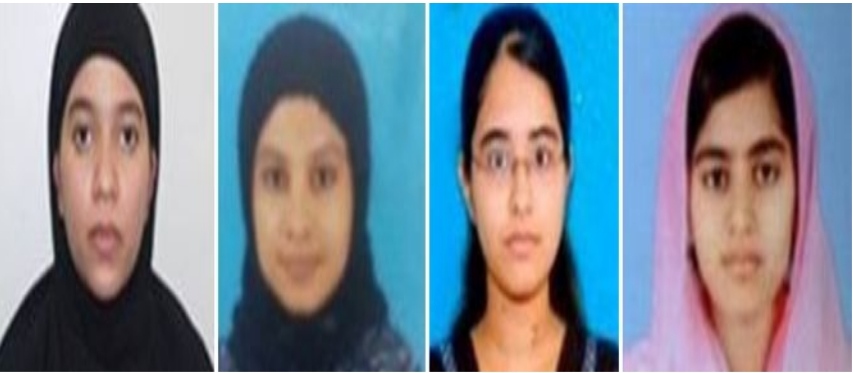India Unlikely To Permit Return Of 4 Kerala Women Who Joined Islamic State

Nimisha alias Fathima Isa, Sonia Sebastian alias Ayisha, Reffeala, and Merrin Jacob alias Mariyam
They had surrendered after their husbands were killed in attacks
The four Indian women lodged in an Afghanistan prison, who accompanied their husbands to join the Islamic State in Khorasan Province (ISKP), are unlikely to be allowed to return to the country, a senior government official said.
The women, all from Kerala, travelled to Nangarhar in Afghanistan in the years 2016-18. Their husbands were killed in different attacks in Afghanistan. The women were among thousands of Islamic State fighters and affiliates who surrendered before the Afghanistan authorities in the months of November and December 2019.
On April 27, Ahmad Zia Saraj, the head of the National Directorate of Security told reporters in Kabul that 408 members of the Islamic State from 13 countries are lodged in Afghanistan prisons. This included four Indians, 16 Chinese, 299 Pakistanis, two Bangladeshis, two from the Maldives among others.
Mr. Saraj also said the Afghanistan government has begun talks with the 13 countries to deport the prisoners. While Afghan officials in Delhi declined to comment, senior officials in Kabul indicated that they awaited word from India on what it proposes to do.
A source, however, said there was no consensus among various government agencies on the return of the four women and it was unlikely that they would be allowed to come back. The women, accompanied by their children were interviewed by Indian security agencies in Kabul in December 2019, a month after their surrender.
In March 2020, Stratnewsglobal.com, a strategic affairs website published a video of the interrogation of the three women. The four women who appeared in the video were identified as Sonia Sebastian alias Ayisha, Raffeala, Merrin Jacob alias Mariyam and Nimisha alias Fathima Isa. A senior official added that there were two other Indian women and a man who had surrendered to the authorities.
“One line of thought was to allow them to come back and become an approver in the cases here. However, their interview revealed that they are highly radicalised. The France model may be followed and the Afghanistan authorities can be requested to put them on trial there,” said the official.
The Interpol has issued red notices against the women on India’s request.
The National Investigation Agency (NIA) had filed a chargesheet in 2017 after a group of 21 men and women from Kerala, including Sebastian, left India in 2016 in batches to join the ISKP in Afghanistan. They crossed over to Afghanistan on foot from Iran.
The NIA said Sebastian, from Kasargod in Kerala left India on May 31, 2016 with her husband, Abdul Rashid Abdulla from Mumbai airport. The agency said “the couple held secret classes in support of IS and Jihad, as propagated by it, during last part of Ramadan, sometimes in the month of July, 2015 in Padanna and Kasaragod.” Sebastian is an engineering graduate.
Merrin Jacob alias Mariyam was married to Bestin Vincent, a resident of Palakkad. Both escaped to Afghanistan in 2016 to live in the IS controlled territory. The couple converted to Islam after their marriage and Vincent assumed the identity of Yahya. Vincent was later killed in Afghanistan.
Vincent’s brother Bexon and his wife, Nimisha alias Fathima, who also converted to Islam had also escaped to Afghanistan with them. Reffeala was married to Ijas Kallukettiya Purayil, 37, a physician from Kasargod, who was likely one of the IS terrorists who stormed a prison in Eastern Afghanistan’s Jalalabad in August 2020. Around 30 persons were killed in the attack.
A June 1, United Nations Security Council report said the ISKP “remains diminished from its zenith, following successive military setbacks that began in Jowzjan in summer 2018.”
“However, since June 2020, it has had an ambitious new leader, Shahab al-Muhajir and it remains active and dangerous” adding that the territorial losses have affected the group’s ability to recruit and generate new funding but it is assessed to retain a core group of approximately 1,500 to 2,200 fighters in small areas of Kunar and Nangarhar Provinces.
The United Nations Assistance Mission in Afghanistan (UNAMA) recorded 77 attacks claimed by ISKP during the first four months of 2021.
Mainly comprising defectors from Tehrik-i-Taliban (TTP), the Wilayat Khorasan of Islamic State in Afghanistan came into existence in 2015. Senior government officials however maintain that ISKP is run by Pakistan’s Inter State Intelligence (ISI).


